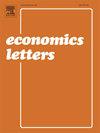How much can you claim?
IF 2.1
4区 经济学
Q2 ECONOMICS
引用次数: 0
Abstract
In a “claims problem” (O’Neill, 1982), a group of individuals have claims on a resource but there is not enough of it to honor all of the claims. A widely studied property of distribution rules, “claims truncation invariance”, advances the existence of a maximal reasonable claim: the endowment of the resource. We examine the implications of imposing any maximal claim, no matter how large. Our conclusions establish the centrality of the “constrained equal awards rule” and its asymmetric generalizations in the class of asymmetric rationing rules (Moulin, 2000).
你能索赔多少?
在“索赔问题”(O 'Neill, 1982)中,一群个人对一种资源有索赔要求,但没有足够的资源来履行所有索赔要求。分配规则的一个被广泛研究的性质“要求截断不变性”,提出了一个最大合理要求的存在性:资源的禀赋。我们检查施加任何最大索赔的影响,无论多大。我们的结论确立了“约束平等奖励规则”的中心性及其在非对称配给规则类中的非对称概括(Moulin, 2000)。
本文章由计算机程序翻译,如有差异,请以英文原文为准。
求助全文
约1分钟内获得全文
求助全文
来源期刊

Economics Letters
ECONOMICS-
CiteScore
3.20
自引率
5.00%
发文量
348
审稿时长
30 days
期刊介绍:
Many economists today are concerned by the proliferation of journals and the concomitant labyrinth of research to be conquered in order to reach the specific information they require. To combat this tendency, Economics Letters has been conceived and designed outside the realm of the traditional economics journal. As a Letters Journal, it consists of concise communications (letters) that provide a means of rapid and efficient dissemination of new results, models and methods in all fields of economic research.
 求助内容:
求助内容: 应助结果提醒方式:
应助结果提醒方式:


